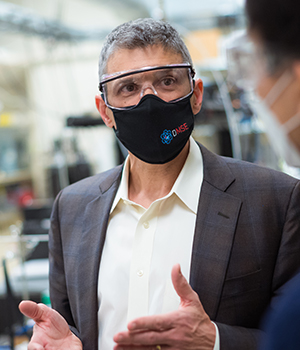
Jeff Grossman
(he/him)
Materials Science and Engineering
Emphasizing life outside the lab
Although some of his research focuses on nanomaterials, MIT Professor Jeff Grossman makes sure that his graduate students receive a macroscopic amount of thoughtful mentorship.
Grossman is a professor of materials science and engineering at MIT, the Morton and Clare Goulder and Family Professor in Environmental Systems, and a MacVicar Fellow, as well as the head of the Department of Materials Science and Engineering. His research involves both experimental and theoretical components, focusing on topics such as clean and renewable energy, water desalination, and nanomaterials. And he was recently honored as Committed to Caring, an MIT recognition of faculty members who go above and beyond in their mentorship of graduate students.
Specialized guidance
No two graduate students have the same academic experience. Grossman recognizes this truth and strives to tailor his mentorship style to each of his students. He sums it up thusly: “Just as no two people are the same, no two ways to mentor and support students are the same, and so I do not take a ‘one-size-fits-all’ approach to mentorship.” Grossman has found that each student requires a different amount of structure in their guidance, and he works with the student over time to find that optimal amount.
Grossman also doesn’t see his role as a mentor as one of supervision, but instead of gentle guidance, inspiration, connections, and collaboration, writing that “I strive to not think that somehow I will have all the answers and know what is best; rather, as a mentor I provide guidance, but equally important I work to expose and connect students to others who can provide different forms of guidance, and also inspiration.” As he explains it, Grossman’s philosophy of advising is centered around treating his mentees as colleagues, not as subordinates or simply students.
Grossman’s respectful mentorship isn’t just limited to his graduate students, either. One nominator wrote enthusiastically about how hands-on and supportive Grossman was of their work as a visiting undergraduate student at MIT. Grossman treated them as a full, respected member of the research group and mentored them as if they were a graduate student. This nominator was so appreciative of Grossman’s mentoring approach that they ended up pursuing their PhD at MIT within Grossman’s group.
This respectful and humble approach to mentorship is greatly valued by his students. One nominator wrote that “Jeff also provides helpful perspective on my research, but allows me to manage my own work and goals while supporting me, which makes me feel trusted.” All in all, Grossman’s tailored approaches to mentorship sets his students up for success.
Work-life balance
Although Grossman emphasizes the importance of doing high-quality work, and strives to ensure that his students have access to the resources they need to be successful, he also makes it clear that he deeply values work-life balance, and he believes that having such a work-life balance makes people more successful scientists and engineers. Grossman believes that “while we may often need to work hard overall, and indeed we are driven by our work in positive ways and that hard work is OK, but that balance is also needed, and without it we will be less effective and less creative.”
This emphasis on work-life balance is also enthusiastically echoed by his nominators. One of them wrote that “when I joined [Grossman’s] group, I felt like I was given weeknight and weekends back — Jeff has openly advocated for students to maintain a healthy work-life balance.” One nominator of Grossman’s notes how they were pleasantly surprised after taking their PhD qualifying exam, when Grossman insisted they take some time off from research in order to rest and recuperate — which was the first time this student had heard a faculty member encouraging a student to spend less time in the lab.
As an example of Grossman’s dedication to showing his students the importance of work-life balance, he regularly sets up out-of-the-lab experiences, which he calls retreats, to allow for his students to bond and relax. Grossman writes that his goal with these retreats is to show his students “that spending this type of time together outside of work is important and must be protected.” It is clear that Grossman’s attempts to emphasize work-life balance as a way to improve the lives of his students has been successful, and that his students appreciate these efforts.
